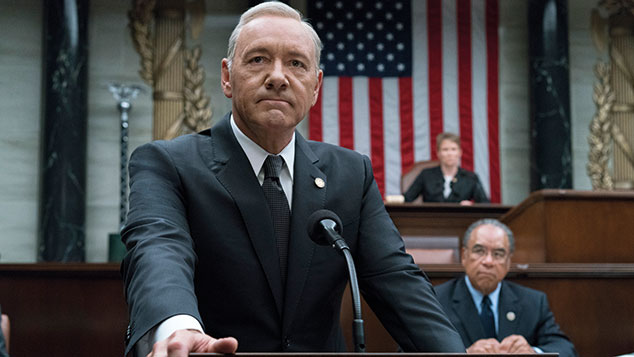
The video-streaming giant is burning cash like a dotcom. Will investors remain patient? Alice Gråhns reports.
“Perhaps Netflix could name one of its up-coming new shows Easy Come, Easy Go,” says Dan Gallagher in The Wall Street Journal. “Investors would appreciate the irony.” In early October the video-streaming giant announced price hikes for subscribers that should generate around $600m in extra revenue next year. The shares rose by 10%. But “the money, alas, will only go so far”. In its third-quarter results announced last week Netflix said it plans to spend between $7bn and $8bn on original content next year, following a record $6bn this year.
This is a whopping amount of money, yet the shares have hit a new record: the company also announced that it had added 5.3 million subscribers last quarter, and now has 109 million worldwide. The strategy is to “spend more now, in order… to win fans around the world”, says Shira Ovide on Bloomberg Gadfly. “The bet is that more and better TV series – preferably those made in-house – are key.”
The “expected bloodbath” in pricey pay-TV subscriptions should help, as Jennifer Saba points out on Breakingviews.People are “ditching” TV packages in favour of on-demand video streaming. American rivals AT&T and Comcast recently issued warnings about a decline in subscribers, which “should mean more viewers for Netflix”. Traditional media companies such as Walt Disney are preparing to launch their own direct-to-consumer packages; Netflix has the advantage in “having offered streaming video for a decade”.
The thing is, says Ovide, Netflix’s costs are rising “even faster than the money coming in the door”. In the past three years, the average quarterly revenue per streaming customer has increased by 14%, while programming costs per customer are up by a third. The focus on in-house production makes sense, but it’s hardly risk-free. The more “Netflix relies on self-made entertainment, the more pressure there is to keep churning out hits”.
In order to “keep feeding the beast”, says Gallagher, Netflix is tapping the debt markets. Long-term debt has climbed by 45% to $45bn since the start of the year. “All will be well” as long as debt investors “keep buying Netflix’s junk-rated bonds to plug the gap”, says Lex in the Financial Times. Their patience is likely to endure as long as today’s “yield-starved” environment does. But if rates rise or Netflix can’t keep up its “impressive run of original hits”, including House of Cards (pictured), then watch out below.
Another challenger bank disappears
“The UK’s challenger banks curry more favour with politicians than patrons,” says Lex in the FT. Giving out licences to new competitors of incumbents deemed “too big to fail” is one thing. “Persuading borrowers and savers to sign up with unfamiliar names is another.” The bid for “niche lender” Aldermore, which specialises in buy-to-let mortgages and is set to become the second challenger to be taken private this year, “suggests greater scale is needed”.
South African group FirstRand is considering an offer of 313p per share – a 33% premium to the average share price for the past six months – for the Reading-based bank. The offer undervalues Aldermore and could tempt competitors to make a higher bid, stockbroker Peel Hunt told The Daily Telegraph.
The $22bn company can certainly argue that “it isn’t overpaying”, says Christopher Thompson on Breakingviews. The offer values the lender at eight times projected 2018 earnings, a “subdued valuation” reflecting fears of a slowing housing market as well as a shake-up in the buy-to-let sector. But “worries about a property slump look overdone”.
Aldermore’s buy-to-let portfolio has a conservative average loan-to-value ratio of 64%, while it has also taken market share from bigger rivals. Meanwhile, shares in other small mortgage lenders, including Virgin Money and Paragon, have jumped. “There could be more bargain-hunting to come.”
City talk
• “More terrible news from Teletubby-land,” says Alistair Osborne in The Times. Character Group has issued a profit warning just days after the board had an irretrievable “loss of confidence” in Mark Dowding, the former finance director. The shares are now down 13%, “mainly due to Toys R Us’s Chapter 11 antics hitting international sales”. Never mind: next year the company will be “‘introducing ‘exceptionally exciting new products’. Not a Mark Dowding voodoo doll, surely?”
• Lawsuits and problems at its Alabama factory wiped 9% off GKN’s share price last week. But retiring chief executive Nigel Stein’s explanation “was a masterclass in reassurance,” says Jim Armitage in the Evening Standard. Stein stressed that the lawsuits were one-off claims and the £15m writedown on its North American operations “was part of a long-known story”.
The engineering group’s first profit warning since 2008 will increase the clamour among analysts for a break-up of the company. Ignore them. The car-parts business “has been purring like a Ferrari while aerospace has been stalling”. The focus should be on getting North America fit again, “not getting waylaid by a complex demerger”.
• “Remember Rod Eddington? He was the Aussie parachuted into British Airways, before Willie Walsh, to turn the airline around after disastrous union disputes,” says Alex Brummer in the Daily Mail. Now he is back in the news.
Activist shareholder group CtW Investment wants him to leave his role as director and chairman of the audit committee at Rupert Murdoch’s 21st Century Fox. It holds him responsible for an alleged cover-up of payments to meet sexual harassment claims at Fox News. “This can’t be helpful in Fox’s battle to acquire the 61% of Sky it doesn’t own.”